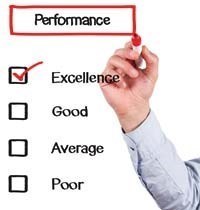
How can you tell whether the on-site property manager at a condominium or homeowners association community is doing a good job? And what is “a good job”? Whether a manager is well-liked and whether he or she manages well may not be the same thing. How do you distinguish one from the other?
Such questions arise whether an association’s board of directors or board of trustees hires the on-site manager or contracts with a property management firm that employs the on-site manager. The major difference is that management firms assume responsibility for periodic performance reviews of on-site managers, although some firms involve their clients in the review process.
If your board hires the manager directly, resources exist to help ensure that your performance-review process is fair and accurately measures his or her performance.
Performance Review Consultants
For a fee, your association can tap into the resources of a consulting firm that will provide forms you can use or adapt, and manage the paperwork and record-keeping. One such vendor is ADP TotalSource, a subsidiary of payroll-processing firm ADP (Automatic Data Processing, Inc.) that provides human-resources services and benefits programs.
To find other vendors, Google the search terms “performance appraisal consultants” and “performance review consultants”—but expect that many of the firms listed are targeting clients much larger than your association. Your board’s attorney may be able to offer a referral, and networking at Community Associations Institute (CAI) and Institute of Real Estate Management (IREM) events also may help you find suitable consulting firms.
Helpful Publications
IREM offers three performance-review publications free to members. Others pay a nominal fee.
• An 11-page Job Performance Evaluation ($12.95) “enables the reviewer and individual to assess and document the degree to which the individual has accomplished specified objectives from the previous review. The evaluation includes descriptions of performance ratings and key areas in which the individual is assessed.”
• Select List of Recommended Performance Measures ($5.95) is a form you can customize to set an employee’s “performance goals and expectations.”
• Annual Performance Scorecard ($3.95), also customizable, is “an organized set of performance measures, grouped according to various aspects of performance.”
Winging It
If you’re going to write your own form, first stir your creative juices by collecting some samples of forms created by others. Google the search term “performance review forms” to access forms from such diverse sources as Employee Performance Solutions, Inc. magazine, the Massachusetts Institute of Technology, or Microsoft Office.
Then your entire board should conduct a workshop to discuss what performance-review criteria belong on your association’s form.
Ian Gopin, president of G&G Management in Newton, Massachusetts, believes communication should top the list. “We created a form a long time ago which basically speaks to our industry as a whole, and what it speaks to is communication because that seems to be the biggest pet peeve of everyone, lack of or how you do it,” he says. “When a condo board reaches out to you as the property manager and you don’t get back to them fast enough or with answers that could be upsetting. You can talk to someone all day, everyday, but if you are not telling them certain things then it’s not really communicating. Say they walk into their building and they see a notice posted with information that they knew nothing about, even though you are speaking to them on a daily basis—that is lack of communication because you are not communicating the right thing.”
Tim Arel, president of North Point Property Management in Amherst, New Hampshire, agrees with Gopin about the importance of communication. “When I receive complaints about communication from clients about property managers, I know they are not doing a good job,” he says. “If a property manager is not returning phone calls or emails that usually means there is a bigger problem, like maybe they are not doing property inspections or overseeing vendors. If they are not spending time on the simpler things, they’re definitely not spending the time on the more complicated things, but it starts with communication.”
“Lack of communication between board members and property managers usually ends up being the number one reason people switch [management firms],” adds Gopin.
Assessing Property Managers
At any job, be it running a multinational investing firm or flipping burgers at a chain restaurant, employees are given periodic reviews of their performance to assess how they’re doing, what their strengths are, and what areas need improvement. Property management companies do the same thing with their employees.
“The process for assessing a manager’s performance is two-pronged: an internal review and an external review,” says Arel. “The external process can vary from someone conducting a survey to someone from the management company arriving on site once a year to meet with the board and get feedback on performance. The internal process is a review process of going through different departments that work with or have interaction with the property manager. What are the procedures for doing certain things? Then we take a look at the minutes that are produced, the review of the financials and the agenda packages that go out. That way we get a gauge to what the issues are, what the property managers are doing well at and what needs a little more attention. A lot of things tend to come to light from other departments.”
“For us and for many of my colleagues in the business, we do extensive employee appraisals and employee evaluations,” adds Gopin. “I do them every six months. I have the director of the division do them with each individual person and if anything comes up, it comes to me after the fact. Every year I personally assess all of my employees. I have a form and it addresses how they communicate with everyone here, job knowledge, planning, organization, quality of work volume-wise and problem solving, which is really big with us.”
Assessing On Your Own
If a building or association board wants to do an annual or semi-annual assessment of their individual manager’s performance on their own, certain criteria should be included.
“Boards should check the property manager’s performance, the administrative team’s performance on an annual basis,” Arel suggests. “They should take a look at the different tasks that a manager does and you take a sampling from the properties that a property manager manages and take it from there. It’s my experience that board members aren’t as proactive as they should be when it comes to assessing their property manager’s performance. They will only let you know there is an issue once it becomes a significant issue as opposed to ‘we have some questions and some concerns’ right up front. That’s where the senior management of the management company comes into play.”
“Every board is completely different, the way they do things and everybody approaches it differently,” says Kenneth Foley, director at NextGen Property Management in Amesbury, Massachusetts. “People come in from all different walks of life; not everybody agrees that something has to be done or how the money should be raised and what projects should be done for the better of the whole. A lot of times people look to close to their own pocketbooks and make a judgment for the whole based on their pocketbooks. It’s the job of the manager to try and convince the trustees that they have a duty that has to be done for the greater good. So that’s the challenge. It also depends on who is doing the evaluating. If it’s somebody from the outside looking in—here’s what we put on the table and what we are slated to do versus someone on the inside who didn’t want to spend the money.”
Red Flags
There are red flags that might indicate that a property manager isn’t fulfilling his or her obligation to a building community.
“When I start getting negative emails from clients, that’s the first indication for me. Nobody includes me as the president unless there is a big issue,” says Gopin. “So when I start getting these emails, that’s when things really pop up for me. Being late with financials has always been a red flag. Generally it means, though maybe not, that something shady is going on. Another indication that there is a problem is if your monthly meeting agenda is the same every month, you know you have a problem, because if you are going over the same pieces of information every month that means it’s not getting completed. We are a task-driven industry and generally if we run into a situation where for six months there is a discussion about the floor in the common area hallways, that means somebody is not doing their job and that’s a scary situation for us.”
Foley agrees with Gopin that if reoccurring issues keep cropping up at board meetings, it means that someone is not doing their job.
“If the same things appear in the minutes every single month and there are the same issues at the annual meeting it means that someone isn’t executing,” says Foley. “We take the last two years of the annual minutes and we look at them and we say, all of this old business is going to go away because you have to get rid of your old business and just talk about the new business. Clearing the slate of the old business is a priority.”
Experts agree that in the end, it’s all about what should be done for the greater good of the property and then executing and getting the job done.
George Leposky is a freelance writer and a frequent contributor to New England Condominium and other publications. Staff Writer Christy Smith-Sloman also contributed to this article.






Comments
Leave a Comment